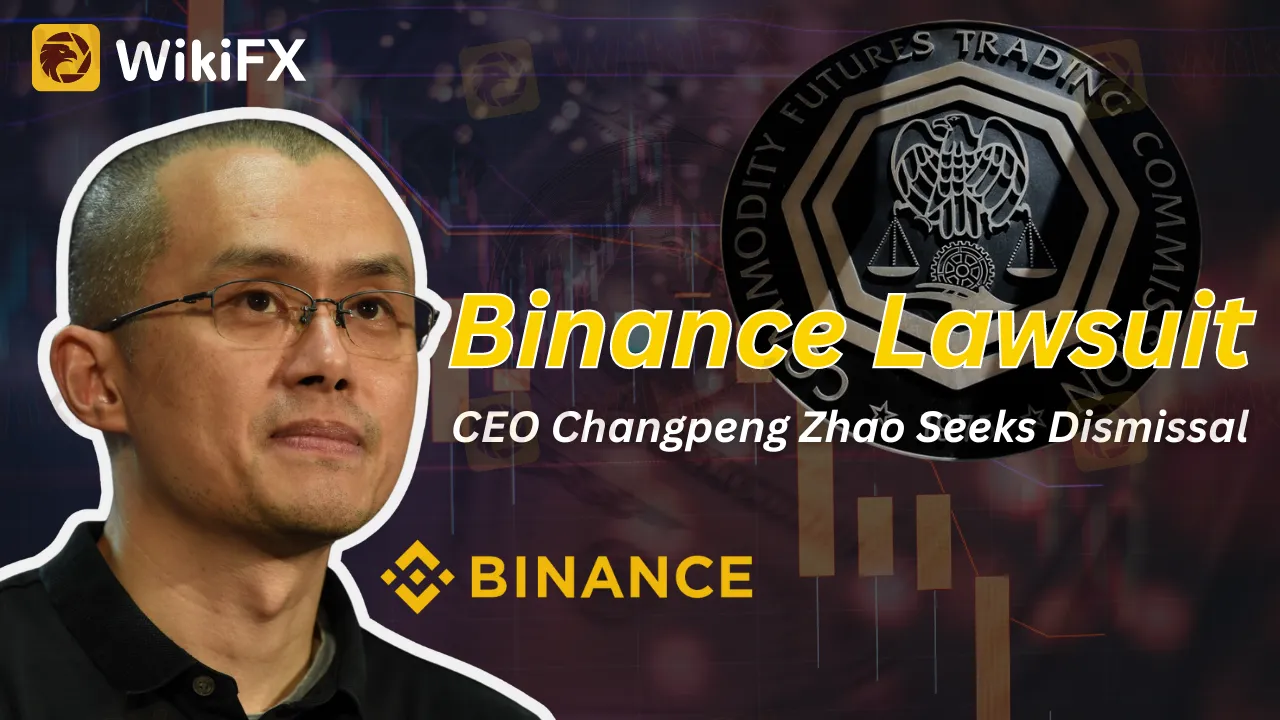简体中文
繁體中文
English
Pусский
日本語
ภาษาไทย
Tiếng Việt
Bahasa Indonesia
Español
हिन्दी
Filippiiniläinen
Français
Deutsch
Português
Türkçe
한국어
العربية
Latest Update on Binance Lawsuit: CEO Changpeng Zhao Seeks Dismissal
Abstract:Latest update: Binance and CEO Changpeng Zhao challenge a CFTC lawsuit, claiming breaches of US derivatives laws. Stay informed on Binance's legal journey.

In the latest development in the world of crypto exchange, Binance and its dynamic CEO, Changpeng Zhao (also known as CZ), are preparing to challenge a lawsuit filed by the U.S. Commodity Futures Trading Commission (CFTC). They are scheduled to present their response to the CFTC's allegations of breaking derivatives laws in the United States on July 27.
Binance, Alongside Its Executives, Takes a Stand Against the CFTC's Allegations
Binance Holdings, which manages the world's leading crypto trading platform, its CEO Changpeng Zhao, and ex-Chief Compliance Officer Samuel Lim have decided to counter the CFTC's complaint. Their determination to dismiss the lawsuit was revealed in a court filing on Monday, as reported by reputable sources like Reuters and Bloomberg.
Unraveling the Story: The CFTCs Initial Lawsuit Against Binance
Back in March, the CFTC accused Binance of contravening U.S. trading and derivatives regulations. The regulatory body claimed that Binance had been offering and carrying out commodity derivatives transactions for U.S. customers since at least July 2019.

The lawsuit centered on the argument that Binance should have registered with the U.S. agency and emphasized that the exchange continued to breach the CFTC's regulations over the years. CZ and his company were accused of running an “illegal” exchange with a “sham” compliance program.
Related news:
Binances Legal Woes Extend to the U.S. SEC
In addition to the CFTC lawsuit, Binance and its CEO, CZ, are facing legal scrutiny from the U.S. Securities and Exchange Commission (SEC). The SEC has accused the exchange and its leadership of infringing securities laws by selling tokens considered unregistered securities, while allegedly misleading investors and regulators.
The Global Pressures on the Crypto Giant
Binance, the crypto behemoth, is confronting a myriad of investigations across the globe. This includes an active probe by the U.S. Justice Department concerning potential money laundering violations and evasion of sanctions. In Belgium, authorities have directed Binance to halt all crypto services. French prosecutors, too, have initiated a money laundering investigation.
Amid these legal challenges, billionaire CEO Changpeng Zhao has sought to pacify customers, following news about company executives departing and reports of widespread layoffs. In the wake of these legal confrontations with U.S. regulators, Binances American subsidiary experienced a considerable decrease in its market share last month.
A Glimmer of Hope for the Crypto Industry Amid Regulatory Crackdown
Despite the current regulatory onslaught on the crypto industry in the U.S., a partial court victory for blockchain firm Ripple in a lawsuit with the SEC over its XRP token and the securities regulator's decision to formally accept financial behemoth Blackrock's application for a spot bitcoin ETF has sparked some optimism.
To stay updated with the latest developments in the financial world, consider downloading and installing the WikiFX App on your smartphone. This App promises to keep you informed about the latest news. Download the App here: https://www.wikifx.com/en/download.html

Disclaimer:
The views in this article only represent the author's personal views, and do not constitute investment advice on this platform. This platform does not guarantee the accuracy, completeness and timeliness of the information in the article, and will not be liable for any loss caused by the use of or reliance on the information in the article.
Read more

U.S. Seizes $225M in Crypto Tied to Massive Scam Operation
U.S. authorities seized $225 million in crypto tied to large-scale scams, aiming to return funds to victims of crypto trading fraud.

Global Stablecoin Regulation Enters New Phase as U.S. Senate Approves Landmark Bill
The U.S. Senate has passed the GENIUS Act, a historic move to regulate stablecoins pegged to the U.S. dollar. As the world’s major economies race to define legal frameworks for digital currencies, this vote marks a pivotal moment—one that echoes Europe’s MiCA rules and mirrors regulatory shifts in Asia.

Philippines Sets Southeast Asia’s First Crypto Regulatory Framework
Philippines launches pioneering crypto regulations, enhancing investor protection and market transparency with strict rules for CASPs.

Tether Freezes $12.3 Million in USDT Over Money Laundering Concerns
Tether freezes $12.3 million in USDT on Tron blockchain, reinforcing its anti-money laundering efforts and compliance with U.S. Treasury sanctions.
WikiFX Broker
Latest News
Overlooking Broker Spreads? It’s Costing You More Than You Think
After Zuckerberg spent billions on an AI dream team,' he has to deliver for Meta shareholders
Gold Prices Fall Instead of Rising, Hitting a Two-Week Low
Nigeria to Launch Sweeping Cybersecurity Reforms Amid Rising Digital Threats
Encountered a problematic response from an AI model? More standards and tests are needed, say researchers
Top Wall Street analysts like these three stocks for long-term growth
Dow futures slide 150 points as oil rises following U.S. bombing of Iran: Live updates
Asia-Pacific markets set to open lower as U.S. bombing of Iran escalates Middle East crisis
Oil at $100 a barrel? U.S. role in Iran-Israel fight fuels market jitters
Consob Blocks 7 Fraudulent Investment Websites Amid Ongoing Crackdown
Currency Calculator



